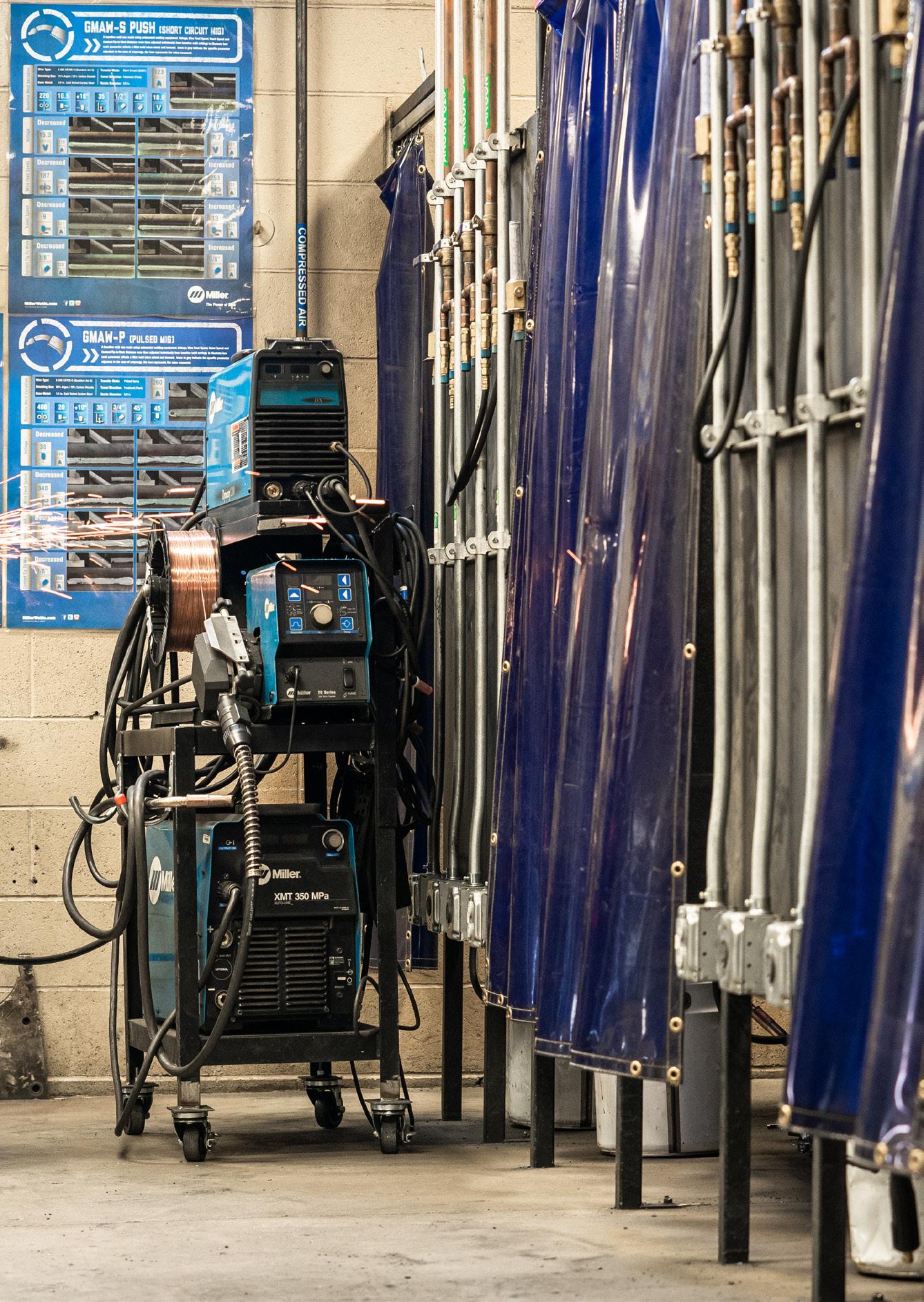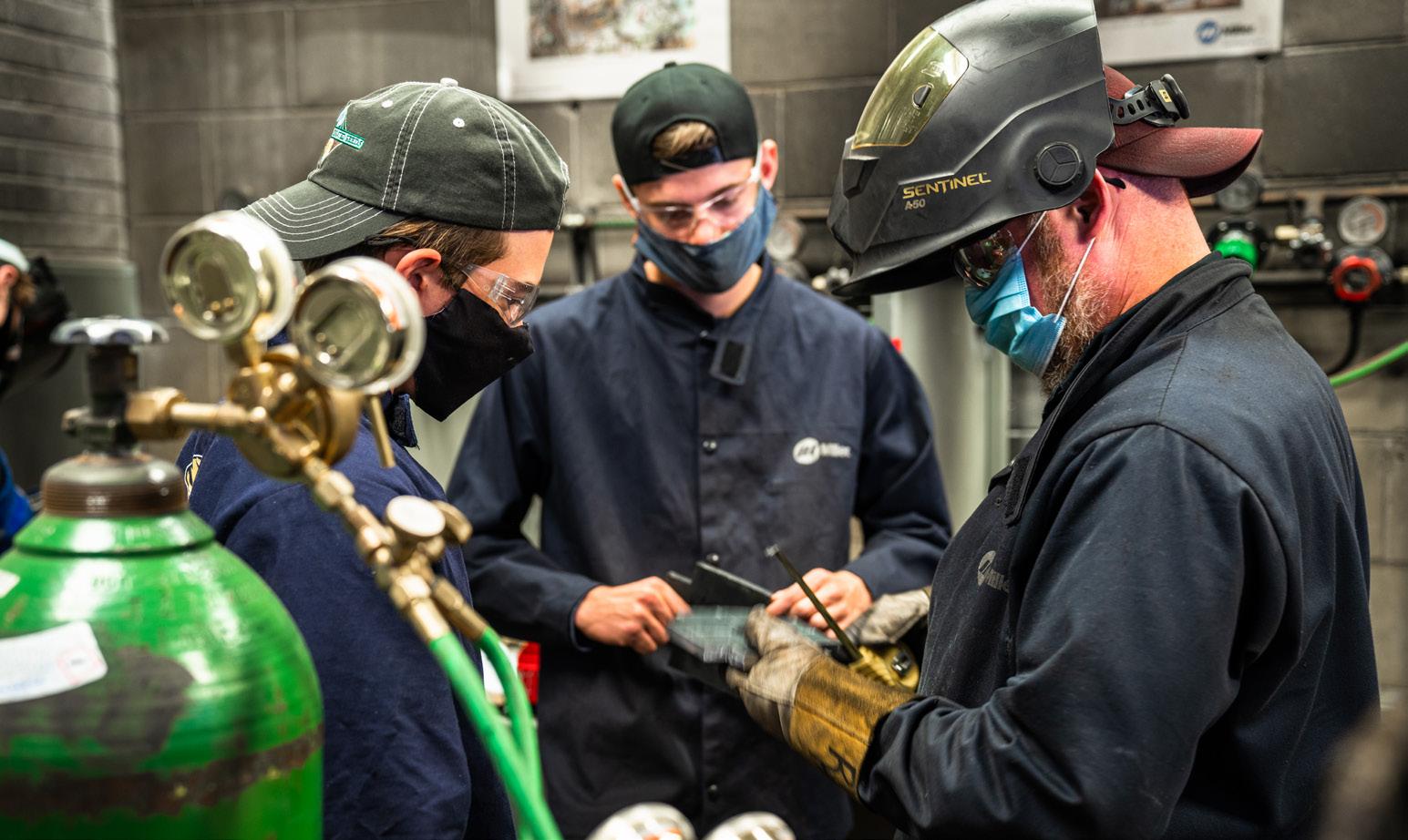
6 minute read
Fremont career academies offer opportunities to dodge county students
Fremont Career Academies offer opportunities to Dodge County students
one out of every dozen students at MCC enters their first quarter at the College as an undecided student. Others have a clear idea of what they want to do for a career, while many may want to explore what is right for them.
At Fremont High School, counselor Mark Williams says he and the other counselors always discuss next steps with their students.
“We meet with our students to talk about postsecondary education and class registration for the next school year. We also talk to students about possible career paths,” Williams says.
In these one-on-one meetings, Williams says he introduces many students to Metropolitan Community College Career Academies.
Career Academies are a specific set of classes designed to introduce high school juniors and seniors to various job fields while helping them get a head start on their postsecondary education. Fremont career academy students get to take classes either in their chosen field or on-site at a location relating to their academy.
“Students in high school should have the opportunities to explore possible careers and interests,” says Todd Hansen, executive director of Student Affairs at the Fremont Area Center. “It gives them opportunities to see what they want to pursue as a career.”
In Dodge County, MCC offers academies in trades such as Diesel Technology and Welding, as well as Criminal

Justice, Information Technology and Healthcare. Students split their time between a classroom setting and practicing hands-on skills.

The trades academies are some of the most popular, Hansen says, especially the Welding Academy.
“Students tell their friends to take it,” Hansen says. “Rob Hocking, MCC instructor and FHS instructor, Brad Ryun, build great relationships with students.”
Having those strong relationships with students is a perk of the job, Hocking says. He serves as a role model for many of them.
“I work very closely with the academy students every day for nine months. I become a mentor to them,” Hocking says. “I am not only teaching them the skills of welding but also life skills that will help them in their adult life, too. Some students start to look up to me and this drives them to constantly try to improve.”
The students have just as much of an impact on him as he does on them, Hocking says.
“They really help me to stay young at heart. I enjoy their enthusiasm and energy. It keeps me energized. Sometimes I feel like a kid again just being around them,” he says.
The Fremont Welding Career Academy began in 2014 to help area industry, which had plenty of open jobs and not enough skilled workers available.
“There is an existing, largely unmet need for skilled entry-level welders,” says Hansen. “The aging workforce and slow trickle of new welders entering the field means employees and their employer are unable to keep up with production demands. The goal was to increase the numbers of skilled welders entering the workforce, allow students to earn high school and college credit at the same time, and develop industry-recognized credentials.”
Students who complete the Welding Career Academy receive a certificate and can oftentimes enter the workforce right away, Hansen explains. Welding Career Academy students have gone on to work at Valmont Industries, Smeal Fire in Snyder, Rebellion in Wahoo and Gnus Manufacturing in Arlington.
“Students know if they successfully complete all five classes, they are employable right away and could make a good starting wage,” he explains. “Students also want to earn the Local Industry Certificate we award them if they are successful. It gives them something to work for and I encourage them to take it to their interviews.” “I am always very proud and happy for a student when I run into them years after the academy and they tell me where they work or what they have built or been a part of a project,” he says. “That alone proves that the Fremont Welding Academy is a success and a very important part of their high school experience.”
Students in the Diesel Academy can also leave the program ready to enter the workforce or continue their education in the field, says instructor Kevin Ingalls.
“When you leave, you’re on the verge of a certificate or can go on to get an associate degree,” Ingalls says. “These students can be very employable right off the bat. Many shops will often pay for tuition reimbursement.”
Fremont High School student Lane Cech came from a family of car lovers. He found out about the Diesel Academy from his high school counselor and decided to enroll.
“I grew up in an auto body shop. That’s where my love of cars came from,” Cech says. “This has helped me get a head start.”

Students are able to learn at Fremont Contract Carriers, a diesel truck transportation company. FCC allows Career Academy students to work on their trucks and learn in their garage, giving students plenty of real-world experience.
“FCC has been very good to us,” says Ingalls.
Much like the welding field, Ingalls says there are many jobs for diesel mechanics. The Diesel Academy is helping to fill in those gaps.
“The only unemployed diesel mechanic is the one not looking for a job,” he says with a laugh.
If students don’t leave high school and enter the workforce, many continue what they learned in their Career Academy at MCC as college students. Hansen says he sees many Career Academy students continue their education, whether it be at MCC or elsewhere.
Williams says this can be a huge accomplishment for many of the students.
“This can be life changing for some of our students,” he explains. “We have many first-generation students, the first in their family to go on to college. So many parents want a better life for their children, but don’t know how to start. The Career Academy programs help students navigate the college process and get them in the system. This will hopefully lead to a lifelong career and let the students live a productive life.”
The benefits of the Career Academy are evident to all students, Hocking says. No one leaves regretting enrolling.
“I have never had a student complete the academy and say ‘It wasn’t worth the hard work I had to put in.’ Or that they wish they hadn’t taken it,” Hocking says. “All the students realize after completing the academy that with hard work and good attendance they can succeed in life after high school.”
To learn more about all available Career Academy programs at MCC, visit mccneb.edu/careeracademy or call 531-MCC-2213. “I have never had a student complete the academy and say ‘it wasn’t worth the hard work I had to put in.’”





